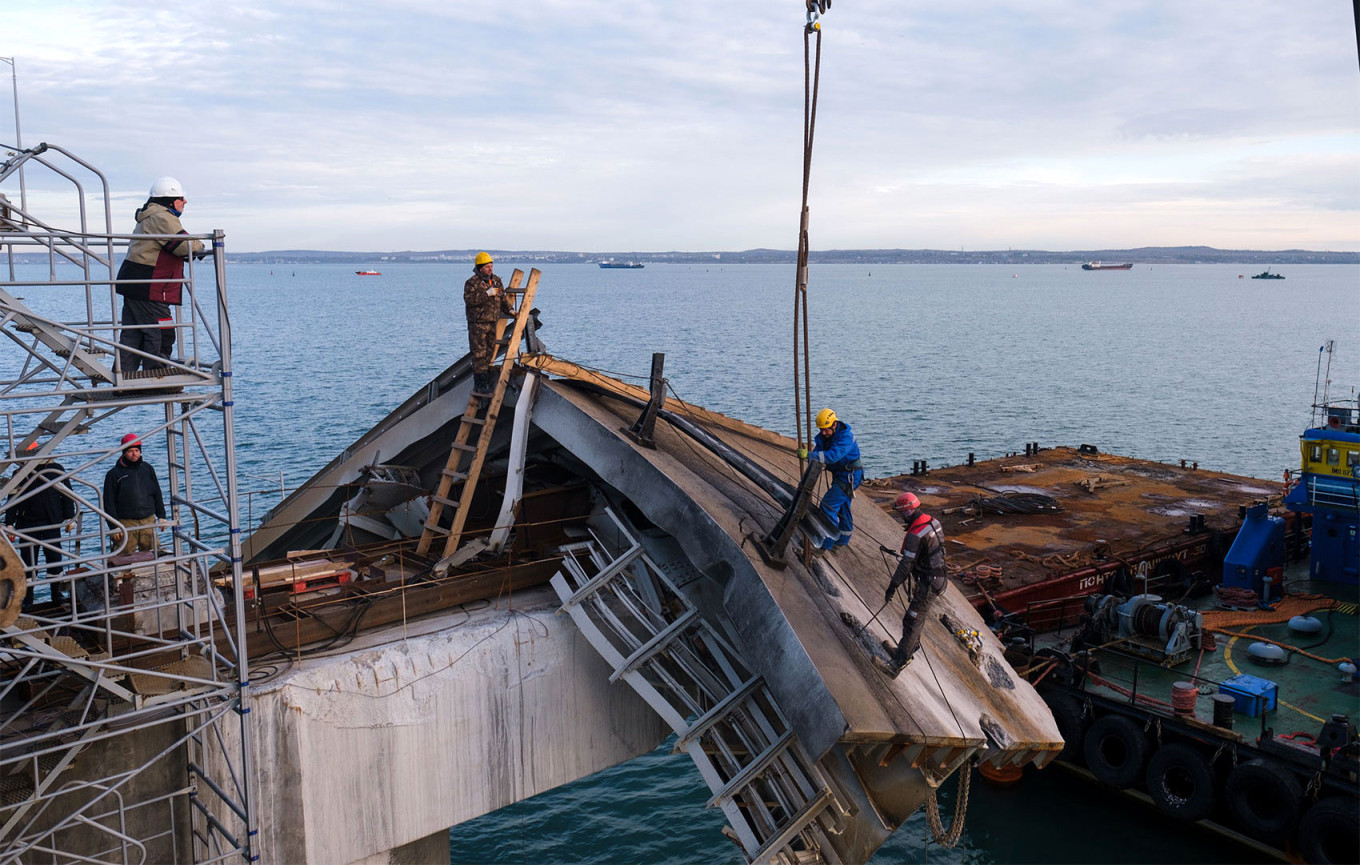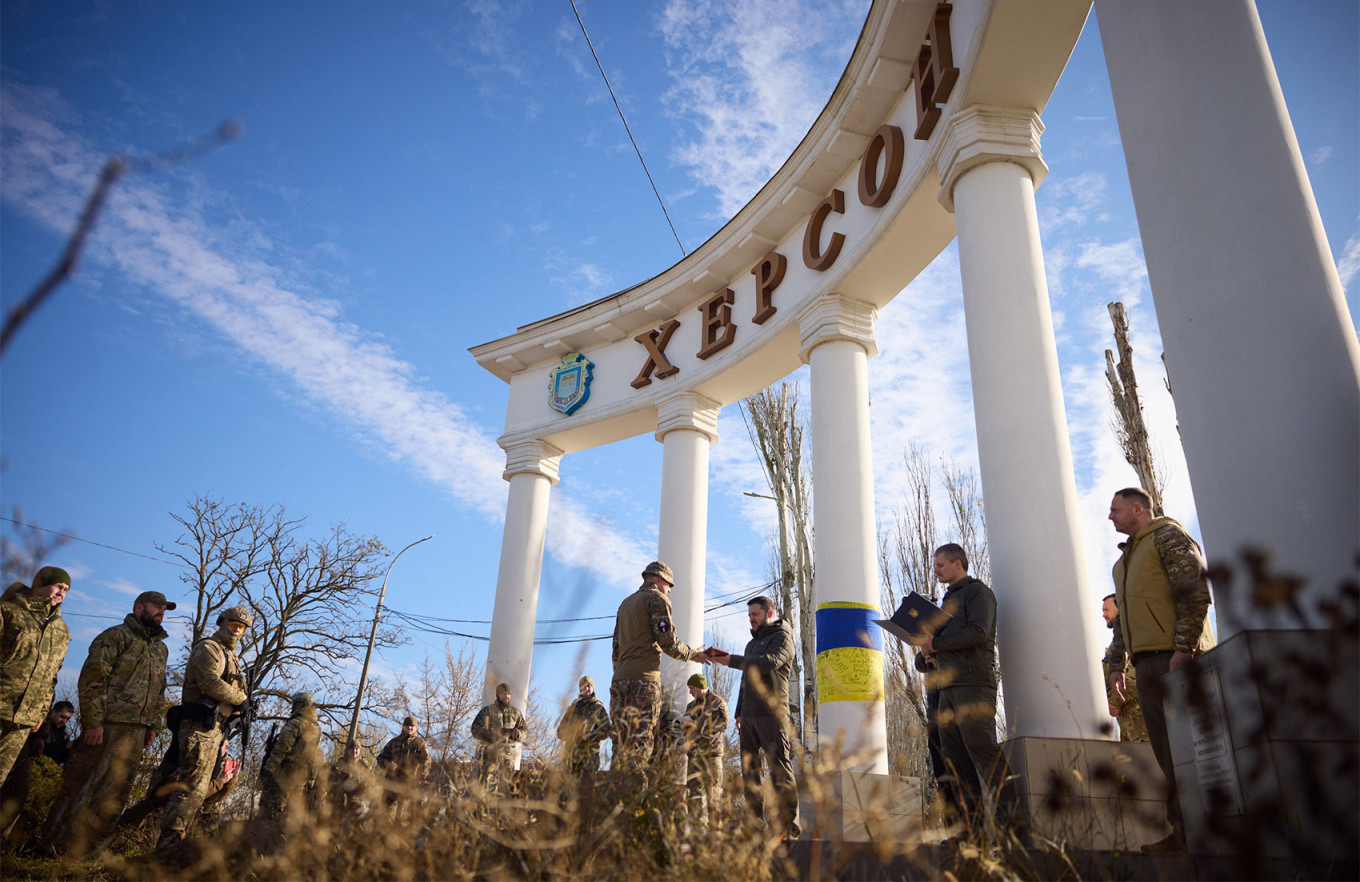The cancellation of Russian President Vladimir Putin’s annual press conference earlier this week was a last minute decision taken due to growing fears the televised event would be dominated by the Ukraine war, six Kremlin and government officials told The Moscow Times.
Putin has held 17 such press conferences — a set piece of the Russian political calendar — since he first became president in 2000 and they traditionally offer him a chance to showcase his command of the issues of the day.
In particular, there were worries in the Kremlin that Kyiv might be able to stage a major attack in the run-up to the event.
“No one could give a 100% guarantee” that such an attack wouldn’t take place, one Kremlin official told The Moscow Times on condition of anonymity.
“The president was aware of this and it was a strong argument against holding the press conference.”
Russia has suffered a series of military humiliations in Ukraine in recent months, including its retreat from Kherson, the only Ukrainian regional capital occupied by Russian forces in the 10-month invasion, and apparent Ukrainian drone strikes on airfields deep inside Russia.
The decision to skip the press conference is a rare sign of how events on the battlefield are directly impacting political decision making in Moscow.

But it is not the only major set piece political event that the Kremlin has sidelined amid the fighting in Ukraine.
Putin has not held his traditional televised call-in show this year — the last such event took place in June, 2021. And the Kremlin has still not set a date for the annual state-of-the-nation address to lawmakers despite Putin’s spokesperson, Dmitry Peskov, promising in September it would take place this year.
Preparations for Putin’s marathon press conference, which involves both Russian and foreign journalists and can last as long as four hours, were well advanced when Putin opted to pull the plug, according to six Kremlin and government officials and a government relations adviser at a major Russian company who all requested anonymity to speak freely.
Speechwriters had even been tasked with working on the major topics on which the president would focus, according to two officials.
“The situation on the frontlines and how it was not developing in the most favorable way was discussed,” said the Kremlin official. “But everyone nodded their heads — the boss is a rock, he can handle it. He will not want to cancel [the press conference], and his ability and experience of working in ‘big genres’ will allow him to turn the situation in his favor. After all, Russia today really is a besieged fortress, and Putin is its commander.”
But doubts began to emerge among top officials last month, according to those familiar with the discussions.
In particular, it was military setbacks in Ukraine that began to worry planners for the event: the withdrawal of the Russian Armed Forces from occupied Kherson, the explosion on the Crimean Bridge, problems associated with the mobilization campaign and Ukrainian attacks on Russian territory.
The last straw for the president was the security services being unable to guarantee that a major Ukrainian attack would not take place in the immediate run-up to the press conference, according to the Kremlin official.
There are similar fears among those in the Kremlin who are preparing for Putin’s state-of-the-nation address, according to the Russian officials who spoke to The Moscow Times.
State-controlled news agency TASS reported Wednesday that the address, which is delivered to both houses of parliament, would be pushed back to 2023.
One of the Kremlin’s other major worries for set piece Putin appearances such as the press conference and the state-of-the-nation address is that associating Putin too closely with the war will negatively impact his popularity.

While draconian censorship laws make assessing the attitude of ordinary Russians toward the Ukraine war extremely difficult, recently leaked government surveys suggest that weariness with the fighting may be spreading.
One Kremlin-commission poll reported by independent media outlet Meduza last month showed 55% of Russians favor peace negotiations with Ukraine, while independent journalists Farida Rustamova and Maxim Tovkaylo reported last week that a government-linked poll suggested 60% of Russians believe Putin did the wrong thing in starting the conflict.
“Take note how the ‘chief’ has been silent about the surrender of Kherson for more than a month,” said the second Kremlin official. “Any statement about the retreat instantly dents his popularity… Others must take the rap.”
Had the press conference gone ahead, it would have been impossible to avoid the Ukraine war from becoming its main topic, according to all six officials who spoke to The Moscow Times.
Traditionally, at the highly scripted event, Putin devotes lots of time to answering questions about social issues — such as housing and healthcare — as well as offering to help out with specific, local problems. But it would have been extremely difficult to impose such an agenda this time.
“Most of the questions would have been like: ‘My brother was mobilized and given a helmet from 1942 and we had to buy footwear for him with our own money… Vladimir Vladimirovich, sort it out!’ And other questions would have been even more inappropriate,” said a second Kremlin official.
Peskov declined to reply to written questions from The Moscow Times about the reasons for the cancellation of the press conference.
But he told journalists Monday that it would not happen this year — and did not give an alternative date in 2023.
Rather than having the president give a speech to the Federal Assembly and host his annual press conference, the Kremlin is looking to associate Putin with “good news” stories, according to officials.
Employees at four major companies in the energy, transport and communications sectors confirmed to The Moscow Times this week that they had received inquiries from the presidential administration about positive events in which Putin could be included.
Lately, Putin has taken part in an unusually large series of public events: from the opening of a turkey farm to birthday celebrations for nuclear energy agency Rosatom and defense conglomerate Rostec, and the unveiling of a newly repaired highway.
Canceling the press conference and postponing the state-of-the-nation address were wise moves from a tactical perspective, according to political analyst Abbas Gallyamov, a former speechwriter for Putin.
But it creates long-term problems for the Russian leadership that cannot publicly ignore the topic of the war forever, he told The Moscow Times.
“This decision testifies to the strategic impasse in which the Kremlin finds itself,” Gallyamov said.